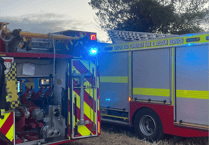THE company building Hinkley Point C has backed an industry taskforce which blames too much regulation for making the UK the most expensive place in the world to build nuclear power stations.
EDF said Hinkley C, the UK’s first new nuclear build in a generation, had spent more than six years trying to overturn a requirement for expensive acoustic fish deterrent equipment to be fitted to its water intakes on the bed of the Bristol Channel.
It said innovative use of an alternative technology meant installation of a safe deterrent system was now possible instead.
An EDF spokesperson said: “Nuclear power provides big environmental benefits for Britain and its reputation for safe operation and construction depends on effective regulation.
“There is an opportunity to improve some regulatory processes to better enable the delivery of essential national infrastructure.
.jpeg?trim=0,0,0,0&width=752&height=501&crop=752:501)
“For example, a disproportionate approach to assessing local environmental impact can add significant costs for projects which face complex and lengthy processes with little additional benefit to nature or local communities.”
An interim report by the Nuclear Regulatory Taskforce (NRT) commissioned by Prime Minister Sir Keir Starmer on Monday (November 24) said a generational change was needed to speed up decision-making.
The taskforce said a ‘radical reset’ of nuclear power rules could save tens of billions of pounds in costs and reverse the industry's decline of recent years.
The report was published as the Government looked to build a new generation of nuclear plants to meet future energy needs and net zero targets.
It said nuclear power today accounted for roughly 15 per cent, or four gigawatts, of the UK electricity mix.
But at its peak in the mid-1990s, nuclear power stations delivered more than 25 per cent of the needs of the electricity grid.
When Hinkley C is up and running around the end of the decade it will generate 3.2 gigawatts, or about seven per cent of UK energy needs.
Sizewell C, which is being modelled on Hinkley C, will come online in the 2030s and meet a further seven per cent of energy needs.
The NRT report said: “The UK is an international leader in nuclear technology, with a strong track record in safety, delivered within a well-respected regulatory system.
“Over time, the regulation of civil and defence nuclear programmes has become increasingly complex and bureaucratic, leading to huge delays and ballooning costs, often for marginal benefit.
“With the UK’s ambitious civil and defence programmes set to expand to meet energy security, net zero, and deterrent demands, a reset is needed.
“Our regulatory system needs radical reform to enable speedy and cost-effective delivery of new civil and defence investment and existing operations.
“We are looking to recommend fundamental once-in-a-generation change in the regulatory system to enable the UK’s nuclear sector to thrive and take full advantage of the global resurgence of nuclear technology.”
It called for the Government to immediately start working on a ‘strategic steer’ which would focus nuclear regulators and duty holders alike on effective delivery without diminishing safety.




Comments
This article has no comments yet. Be the first to leave a comment.